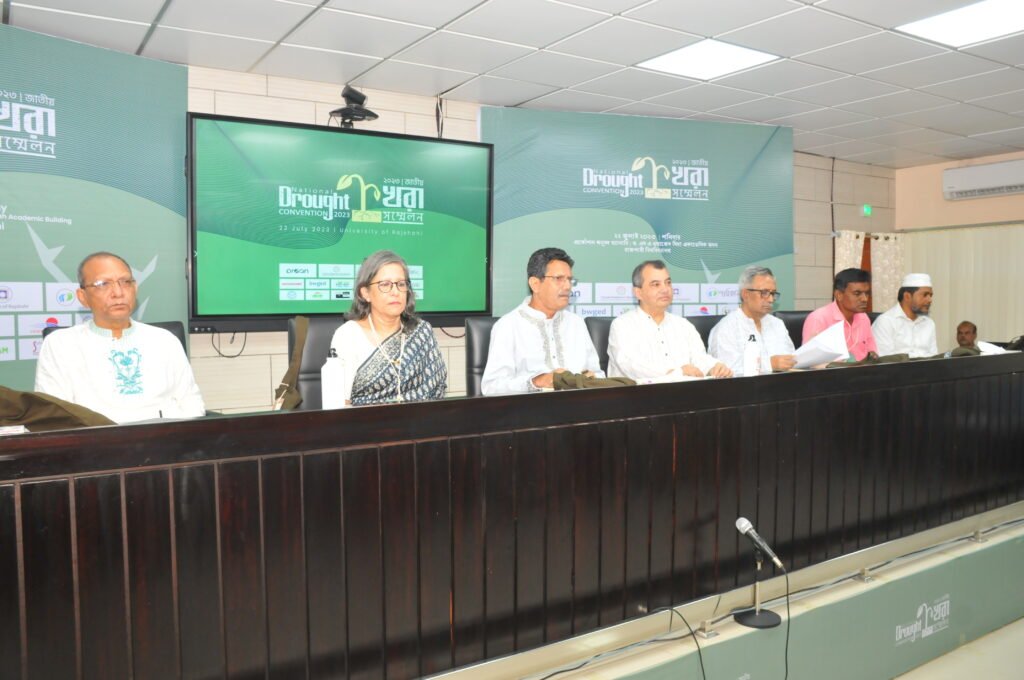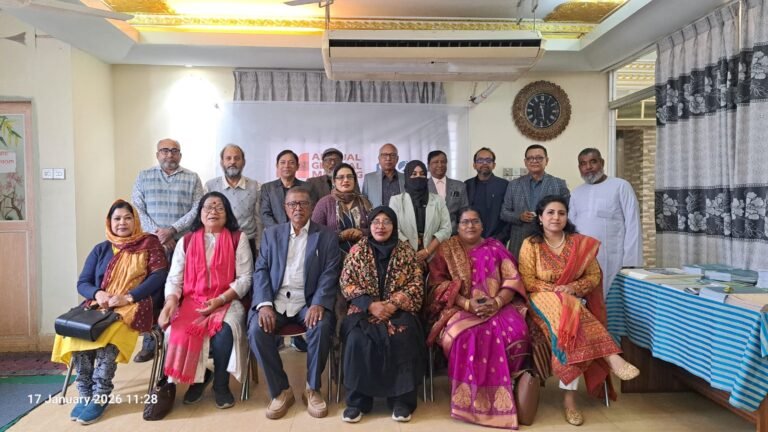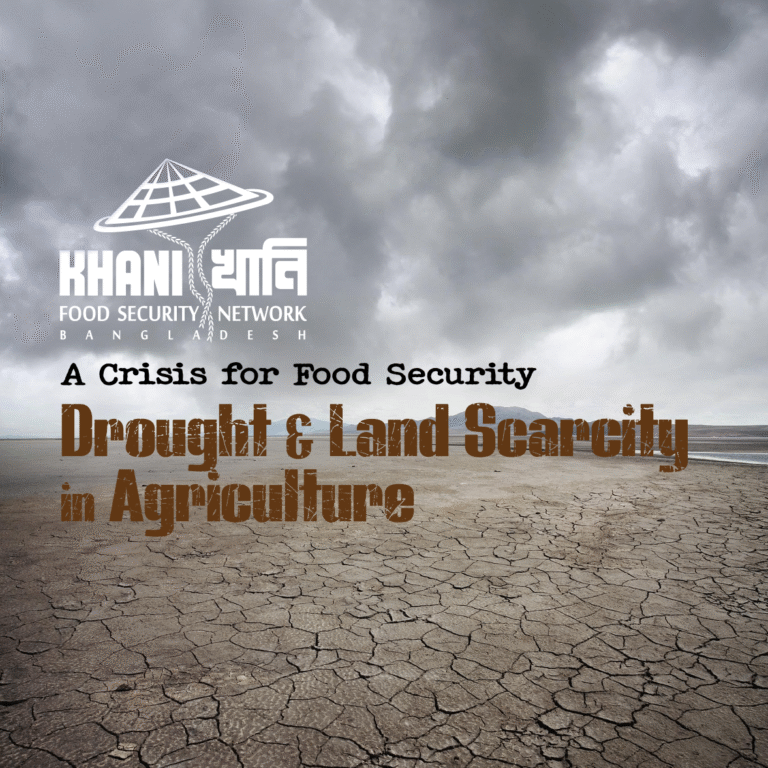 The alarming impact of climate change on various sectors, particularly agriculture, has become a pressing concern globally. The adverse effects of climate change are being felt more acutely in drought-prone regions, posing a significant threat to food security, public health, and the overall well-being of communities. To address these challenges and foster proactive solutions, the National Drought Convention 2023 was held at Rajshahi University (RU) on 22 July 2023. The conference aimed to bring together policymakers, academics, researchers, development activists, and various stakeholders to discuss and formulate strategies for mitigating climate change’s impacts, particularly in Bangladesh’s Barind region.
The alarming impact of climate change on various sectors, particularly agriculture, has become a pressing concern globally. The adverse effects of climate change are being felt more acutely in drought-prone regions, posing a significant threat to food security, public health, and the overall well-being of communities. To address these challenges and foster proactive solutions, the National Drought Convention 2023 was held at Rajshahi University (RU) on 22 July 2023. The conference aimed to bring together policymakers, academics, researchers, development activists, and various stakeholders to discuss and formulate strategies for mitigating climate change’s impacts, particularly in Bangladesh’s Barind region.
The convention served as a platform for policy planners, academics, researchers, and development activists to unite in their efforts to combat the adverse impact of climate change. The event was organized by the Participatory Research and Action Network (PRAAN), in collaboration with various like-minded organizations. Its central focus was on enhancing drought resilience, minimizing risks, and fostering proactive planning, adaptation, and management strategies. The convention acknowledged that integrated efforts from public, private, and research organizations are key to mitigating the adverse impact of climate change in the drought-prone Rajshahi region.
Saber Hossain Chowdhury, the Member of Parliament and the Prime Minister’s special envoy for climate change, brought his expertise to the convention as the chief guest. As the chair of the Parliamentary Standing Committee on the Ministry of Environment, Forest and Climate Change, He emphasized the significance of in-depth research to shield the region from climate change’s detrimental effects. He also noted that the government had allocated approximately Taka 37,000 crore in the current national budget to support climate change adaptation and resilience efforts. Saber Hossain Chowdhury described the consequences of climate change as an existential threat and urged the exploration of innovative solutions and possibilities.

Fazley Hossain Badsha, MP, recognized the urgent need to transition from unregulated groundwater usage to controlled water reservoirs for irrigation. He advocated for this shift as an essential step towards elevating agricultural production and ensuring food security. He also stressed the importance of safeguarding the rights of farmers and other stakeholders to incentivize increased agricultural output.
Omor Faruque Chowdhury, MP, acknowledged the monumental contributions of farmers to the nation’s agricultural development. He highlighted the imperative of preserving the privileges due to them and ensuring comprehensive protection of their interests. The convention was enriched by the presence of numerous distinguished figures, including RU Vice-chancellor Prof Golam Sabbir Sattar, Country Director of ActionAid Bangladesh Farah Kabir, and Rezaul Karim Chowdhury, Vice President of KHANI, Bangladesh, chaired the inaugural session during the National Drought Convention.
Professor ANK Noman, Chairman of the Department of Economics at RU, delivered a keynote presentation that offered insights into climate change vulnerability and climate justice. He presented a comprehensive set of recommendations to mitigate climate change impacts, emphasizing the need to forge meaningful connections among various stakeholders such as policymakers, academia, administrators, communities, development partners, civil society organizations, media, students, and youth. These connections are crucial to achieving desired outcomes in the ongoing battle against climate change.
Parallel sessions were a hallmark of the convention, facilitating discussions among approximately 150 participants hailing from academic institutions, development organizations, professional bodies, and other relevant sectors. These sessions aimed to channel collective knowledge and formulate sustainable strategies for addressing the challenges presented by drought and climate change.
A critical issue addressed at the convention was the excessive use of groundwater for rice production in the High Barind region. Experts proposed an alternative approach of cultivating high-value crops like mango, guava, and dragon fruit, which consume less water and yield higher incomes for farmers. This shift not only addresses the region’s water scarcity but also contributes to the economic sustainability of local communities.
Rajshahi University Vice-Chancellor Prof Golam Sabbir Sattar echoed concerns over the overuse of groundwater. He highlighted that the authorities’ lenience in this regard has depleted both surface and groundwater resources, leading to inequalities among farmers. Such disparities were underscored by lawmaker Fazle Hossain Badsha, who cited the tragic deaths of two Santal farmers in Rajshahi’s Godagari upazila last year due to water-related issues.
The convention’s discussions underscored the urgency of protecting water resources and promoting sustainable agricultural practices. ActionAid Bangladesh’s Country Director Farah Kabir emphasized the repercussions of unresolved drought issues, which could exacerbate climate migration challenges. In response, Saber Hossain Chowdhury, Chairman of the Parliamentary Standing Committee on Environment, Forest and Climate Change, urged researchers and development activists to devise actionable strategies for the government.
Professor Rezaur Rahman of the Department of Geography and Environmental Sciences at Rajshahi University highlighted the region’s ongoing drought-like situation. Escalating temperatures and reduced rainfall have created a dire situation, affecting public health and ecosystem stability. Rahman emphasized that global warming, driven by factors like carbon emissions, must be mitigated through substantial afforestation efforts. He advocated for transforming irrigation systems from groundwater-based to surface water-based and promoting less water-consuming crops.

The National Drought Convention 2023 was a clarion call for collective action in the face of climate adversity. By fostering partnerships among diverse stakeholders and promoting sustainable practices, the convention paved the way for innovative solutions to mitigate the challenges posed by drought and climate change. As the impacts of climate change continue to intensify, events like these serve as beacons of hope, inspiring united efforts to safeguard our environment and livelihoods.
#PRAANbd



